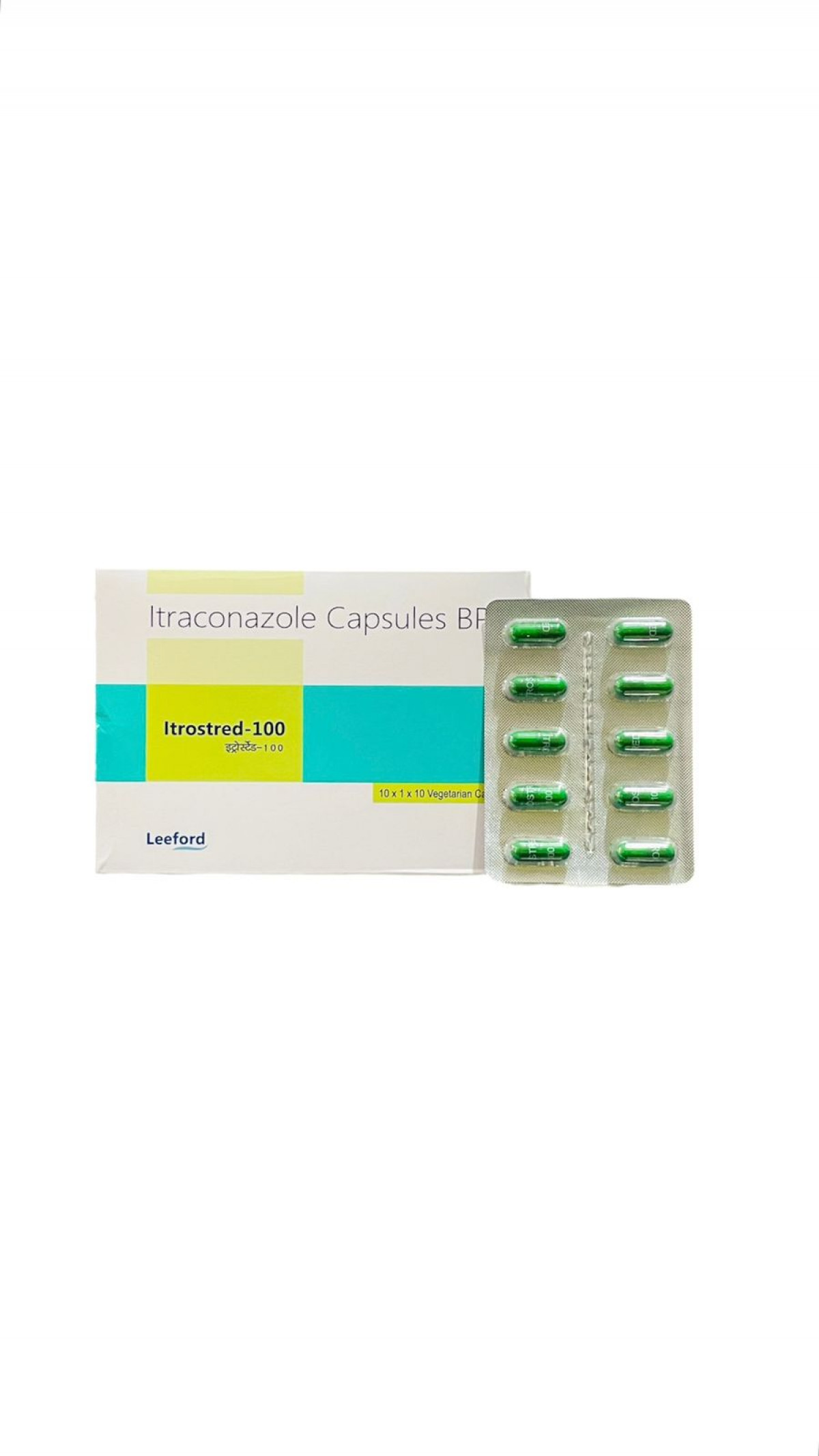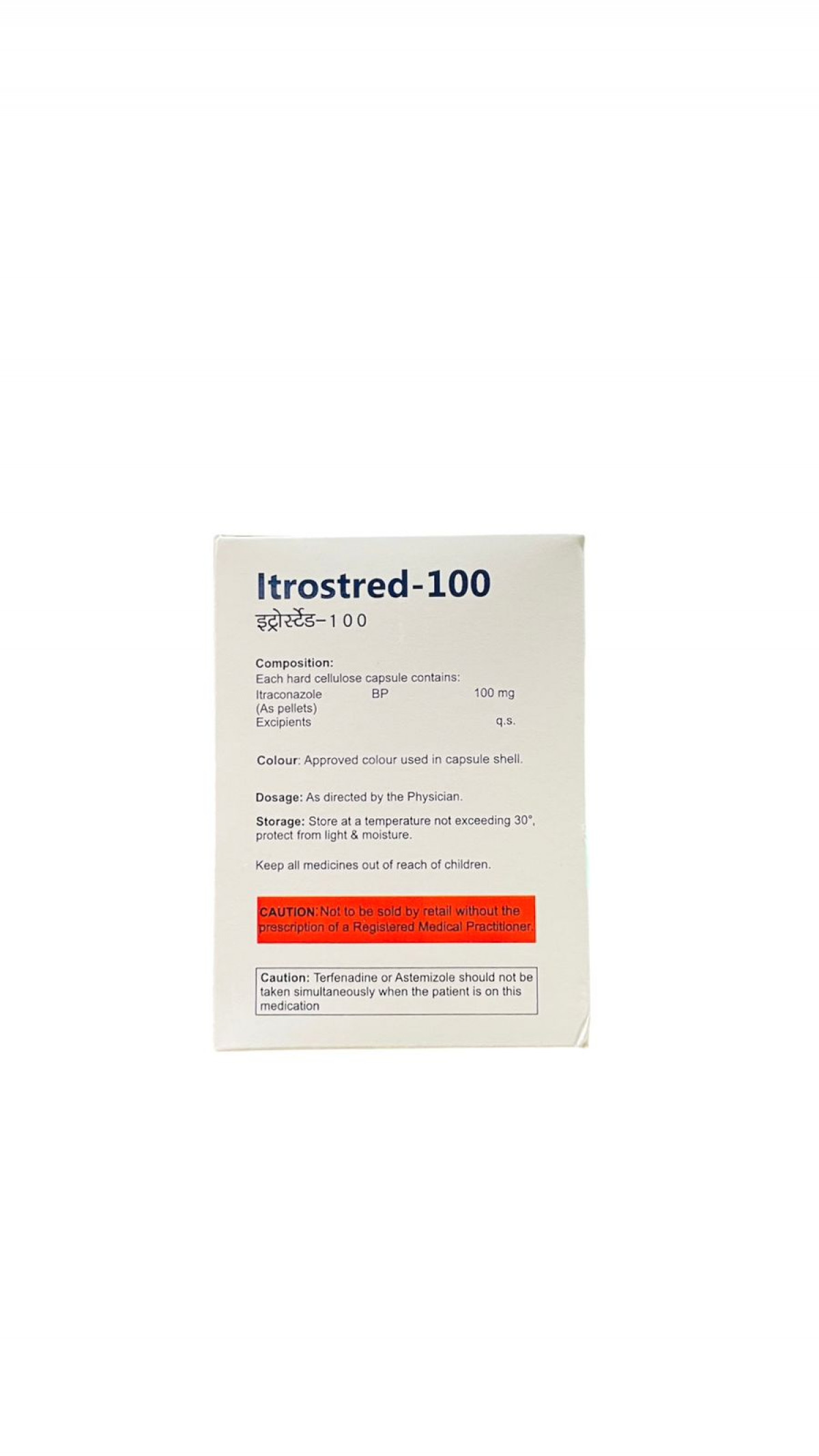ITROSTRED-100 CAPSULES 10's
Manufactured By Leeford Healthcare
Composition ltraconazole 100 mg (Blister)
Rs 91.39
MRP Rs 186.70
(51.05% OFF)
Includes all taxes
Package SIZE
( 1x10 CAPSULES )
100% Authentic
Products
Free
Shipping*
Products
Return Policy
Description:
Pregnancy Interaction
- Use in pregnancy: Itraconazole is not advised during pregnancy unless the infection poses a life-threatening risk and the potential benefits surpass the associated risks.
- Animal studies have indicated potential damage to the developing fetus; therefore, it should be administered solely under rigorous medical supervision.
- Women of reproductive age should employ effective contraception throughout the course of treatment and maintain its use for a minimum of one menstrual cycle following cessation of the medication.
- During breastfeeding, trace quantities of itraconazole may be transferred into breast milk—use should be avoided unless explicitly authorized by a healthcare professional.
How it works
- Itraconazole functions by inhibiting ergosterol synthesis, a vital component of the fungal cell membrane.
- This compromises the integrity of the fungal cell wall, resulting in cell leakage and the subsequent demise of the fungus.
- It exhibits a broad spectrum of activity against dermatophytes, yeasts (Candida species), and systemic fungi (Aspergillus, Histoplasma).
- The medication concentrates in keratin-rich tissues such as the epidermis and nails, ensuring sustained protection even after the treatment course is completed.
How to use
- Administer the capsule in accordance with your physician's instructions.
- Typically administered following meals to enhance assimilation.
- Swallow the capsule entirely with a tumbler of water—do not crush or chew.
- Proceed with the complete course of treatment even if symptoms improve in order to prevent relapse.
- If you neglect a dose, administer it at the earliest opportunity unless it is nearly time for your next scheduled dose—under no circumstances should a double dose be taken.
- Store below 30°C in a cold, dry environment, protected from direct sunlight and humidity.
Uses/Indications
- Fungal skin disorders (Tinea corporis, Tinea cruris, Tinea pedis).
- Oral candidiasis and vaginal candidiasis (yeast infection).
- Fungal Nail Infections (Onychomycosis).
- Systemic fungal infections: Aspergillosis, Histoplasmosis, and Blastomycosis.
- Seborrheic dermatitis and pityriasis versicolor (fungal dandruff).
- Recurrent or resistant fungal infections unresponsive to topical antifungal treatments.
Side Effects
Common:
- Nausea, emesis, or gastrointestinal discomfort.
- Headache or vertigo.
- Mild dermatitis or pruritus.
- Diarrhea or constipation.
Uncommon:
- Fatigue, alterations in taste, or abdominal congestion.
- Minor edema in the ankles or feet.
Serious (infrequent):
- Liver impairment: jaundice of the eyes and skin, dark urine, or ongoing nausea.
- Cardiovascular issues: experiencing shortness of breath, chest discomfort, or edema.
- Severe allergic reactions: rash, facial edema, difficulty breathing (please seek emergency assistance).
Medicine Interaction
- Itraconazole interacts with numerous other medications. Always notify your healthcare provider of all medications and supplements you are currently using.
- Refrain from or exercise prudence when using:
- Antacids or acid-suppressing agents (such as omeprazole and pantoprazole) diminish the absorption of itraconazole.
- Rifampicin, phenytoin, and carbamazepine diminish the efficacy of itraconazole.
- Certain cardiac medications (quinidine, dofetilide, and cisapride) may induce severe arrhythmias.
- Statins (simvastatin, lovastatin): elevate the risk of muscle injury.
- Oral contraceptives: marginal decrease in efficacy—employ supplementary contraceptive methods.
- Alcohol: completely abstain—it elevates liver stress and the risk of toxicity.
Expert advice
- Always consume after meals to optimize absorption.
- Complete the entire program to effectively prevent relapse.
- Refrain from consuming alcohol and antacids while undergoing treatment.
- Notify your physician promptly if you observe any indications of liver problems, such as jaundice of the skin or eyes, or dark urine.
- Notify your physician if you have any pre-existing heart, liver, or kidney conditions prior to commencing treatment.
- For extended treatments, such as those for nail infections, periodic liver function tests (LFTs) may be necessary.
- Refrain from self-medicating or distributing the medication to others.
- Keep this out of the reach of minors.
FAQs for Medicine?
Q1. What is the purpose of Itrostred-100?
It is employed in the treatment of fungal infections affecting the epidermis, nails, oral cavity, vagina, and internal organs.
Q2. Is Itrostred-100 considered safe for use during pregnancy?
No. It is not advised during pregnancy unless the infection is severe and poses a threat to life.
Q3. Is it permissible to consume Itrostred-100 with food?
Certainly. It should be administered following meals to ensure optimal absorption.
Q4. Is it permissible to consume alcohol while taking this medication?
No. Alcohol consumption elevates the risk of liver injury and should be abstained from.
Q5. What are the consequences of missing a dose?
Administer it promptly upon recall, but omit it if your next scheduled dose is imminent. Refrain from duplicating.
Q6. Does Itrostred-100 induce dizziness?
Yes, moderate dizziness may be experienced. Refrain from driving or operating machinery until you are aware of how it impacts you.
Q7. Is Itrostred-100 compatible with the use of antacids?
Refrain from using antacids within two hours before or after administering this capsule, as they may impair absorption.
Q8. What is the recommended duration for continuing treatment?
The duration is variable depending on the infection:
Skin infections: 1–4 weeks
Nail infections: a duration of 3 to 6 months
Systemic infections: in accordance with the physician's instructions
Q9. Is it permissible to take Itrostred-100 concurrently with antibiotics?
Only when officially prescribed. Itraconazole may interact with certain antibiotics; it is essential to inform your healthcare provider.
Q10. Are exams required while using Itrostred-100?
Yes, liver function tests may be recommended for long-term or repeated courses to ensure safety.




